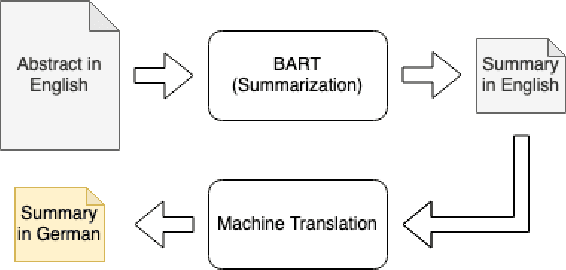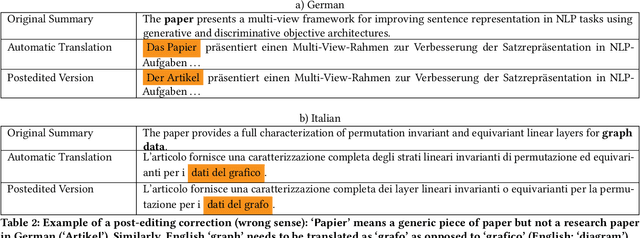Niklas Friedrich
X-SCITLDR: Cross-Lingual Extreme Summarization of Scholarly Documents
May 30, 2022



Abstract:The number of scientific publications nowadays is rapidly increasing, causing information overload for researchers and making it hard for scholars to keep up to date with current trends and lines of work. Consequently, recent work on applying text mining technologies for scholarly publications has investigated the application of automatic text summarization technologies, including extreme summarization, for this domain. However, previous work has concentrated only on monolingual settings, primarily in English. In this paper, we fill this research gap and present an abstractive cross-lingual summarization dataset for four different languages in the scholarly domain, which enables us to train and evaluate models that process English papers and generate summaries in German, Italian, Chinese and Japanese. We present our new X-SCITLDR dataset for multilingual summarization and thoroughly benchmark different models based on a state-of-the-art multilingual pre-trained model, including a two-stage `summarize and translate' approach and a direct cross-lingual model. We additionally explore the benefits of intermediate-stage training using English monolingual summarization and machine translation as intermediate tasks and analyze performance in zero- and few-shot scenarios.
AnnIE: An Annotation Platform for Constructing Complete Open Information Extraction Benchmark
Sep 15, 2021



Abstract:Open Information Extraction (OIE) is the task of extracting facts from sentences in the form of relations and their corresponding arguments in schema-free manner. Intrinsic performance of OIE systems is difficult to measure due to the incompleteness of existing OIE benchmarks: the ground truth extractions do not group all acceptable surface realizations of the same fact that can be extracted from a sentence. To measure performance of OIE systems more realistically, it is necessary to manually annotate complete facts (i.e., clusters of all acceptable surface realizations of the same fact) from input sentences. We propose AnnIE: an interactive annotation platform that facilitates such challenging annotation tasks and supports creation of complete fact-oriented OIE evaluation benchmarks. AnnIE is modular and flexible in order to support different use case scenarios (i.e., benchmarks covering different types of facts). We use AnnIE to build two complete OIE benchmarks: one with verb-mediated facts and another with facts encompassing named entities. Finally, we evaluate several OIE systems on our complete benchmarks created with AnnIE. Our results suggest that existing incomplete benchmarks are overly lenient, and that OIE systems are not as robust as previously reported. We publicly release AnnIE under non-restrictive license.
DebIE: A Platform for Implicit and Explicit Debiasing of Word Embedding Spaces
Mar 11, 2021


Abstract:Recent research efforts in NLP have demonstrated that distributional word vector spaces often encode stereotypical human biases, such as racism and sexism. With word representations ubiquitously used in NLP models and pipelines, this raises ethical issues and jeopardizes the fairness of language technologies. While there exists a large body of work on bias measures and debiasing methods, to date, there is no platform that would unify these research efforts and make bias measuring and debiasing of representation spaces widely accessible. In this work, we present DebIE, the first integrated platform for (1) measuring and (2) mitigating bias in word embeddings. Given an (i) embedding space (users can choose between the predefined spaces or upload their own) and (ii) a bias specification (users can choose between existing bias specifications or create their own), DebIE can (1) compute several measures of implicit and explicit bias and modify the embedding space by executing two (mutually composable) debiasing models. DebIE's functionality can be accessed through four different interfaces: (a) a web application, (b) a desktop application, (c) a REST-ful API, and (d) as a command-line application. DebIE is available at: debie.informatik.uni-mannheim.de.
 Add to Chrome
Add to Chrome Add to Firefox
Add to Firefox Add to Edge
Add to Edge